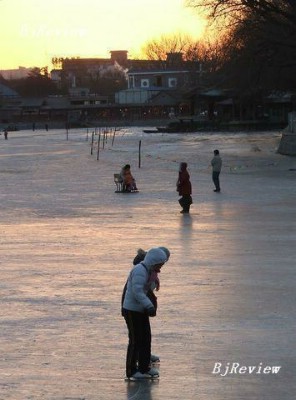
There is something very odd about the weather in Beijing. It's mid-February when, according to my experience, my bones should be rattling and all the city's lakes should be frozen solid. But here I am basking in sunlight with not a cold front in sight, let alone a cold shudder. Something's wrong.
While walking to work, I can see that the oh-so-attractive quilted jackets that fend off polar conditions are fast being shed for less cumbersome apparel, as the mercury rose on February 5 to 16 degrees Celsius. Media reports say this is the highest since records were first kept way back in 1840. Something's wrong.
Those who thought of getting in some prime skating time over the holidays had to make a rapid change of plans as many of the lakes around the capital have slapped a ban on skating due to the danger it poses with the meltdown.
In my neighborhood, people venturing out onto the ice at Purple Bamboo Park's lake do so at their own peril and in the confines of a penned enclosure. While I watched these daredevils skating about in hurried patterns, the creaking sound of ice announcing its return to liquid was very evident. It spooked us all.
And I could be forgiven for seeming delusional seeing magnolia trees budding on Chang'anjie Avenue, the city's famed thoroughfare. These trees usually sprout forth in early April, an indication that their biological clocks are in total disarray. Something's wrong.
Qin Dahe, Chief of the China Meteorological Administration, believes that the extreme weather conditions being experienced in Beijing result from global warming, which has also brought high temperatures, drought and hurricanes to the entire country.
And more, a Chinese report released last month claimed climate change would possibly cause large drops in agricultural output. In the latter half of this century, production of wheat, corn and rice in China was very likely to drop by as much as 37 percent. The country's average temperatures would rise by 2 or 3 degrees Celsius in the next 50 to 80 years, the report said, leading to evaporation rates of 15 percent for some inland rivers. China already faces a severe water shortage, especially in the northern part of the country, so these predictions are very bad news.
The United Nations Intergovernmental Panel on Climate Change recently released a report announcing that global warming is by all accounts caused by human activity and is expected to continue for several hundred years. Now isn't that a complete surprise. It's the first time any reputable body has actually admitted something that's palpable to anyone who truly takes an interest in the planet we all live on.
But Qin conceded that China "lags behind Europe and the United States" in the technology needed to clean its coal, which accounts for 69 percent of its energy output, and that it is time to catch up and catch up fast.
It is no secret that China is keen to lessen its reliance on coal, but the cost of adapting to cleaner energies on a big scale would be too expensive right now for a developing economy with several other priorities.
As the world's biggest producer and user of coal, it is widely reported that China will exceed the United States in its output of greenhouse gas emissions by 2020. And greenhouse gas emissions, and carbon dioxide discharges in particular, are generally considered to be the prime factor in global warming.
Qin said that the Chinese Government had already set a "very ambitious and arduous goal" of reducing carbon dioxide and other emissions by 4 percent a year over the next five years.
Apart from damage to the environment, the financial implications of global warming are sobering, causing direct economic losses of up to $37.5 billion in China annually, which was equivalent to 2 to 5 percent of China's gross domestic product.
The Chinese Government's position on where the responsibility for climate change rests is clear. "You need to point out that climate changes are the result of long-term emissions of the developed countries," said Foreign Ministry Spokeswoman Jiang Yu.
But irrespective of who's to blame, and we need to move way past the blame game, the fact remains that on a global level there needs to be a collective effort to make commitments to reduce the emissions damaging the climate and ensuring those commitments are adhered to. If not, global warming won't only be giving winter in Beijing the cold shoulder, but we'll all be looking for another planet to live on. n
| 